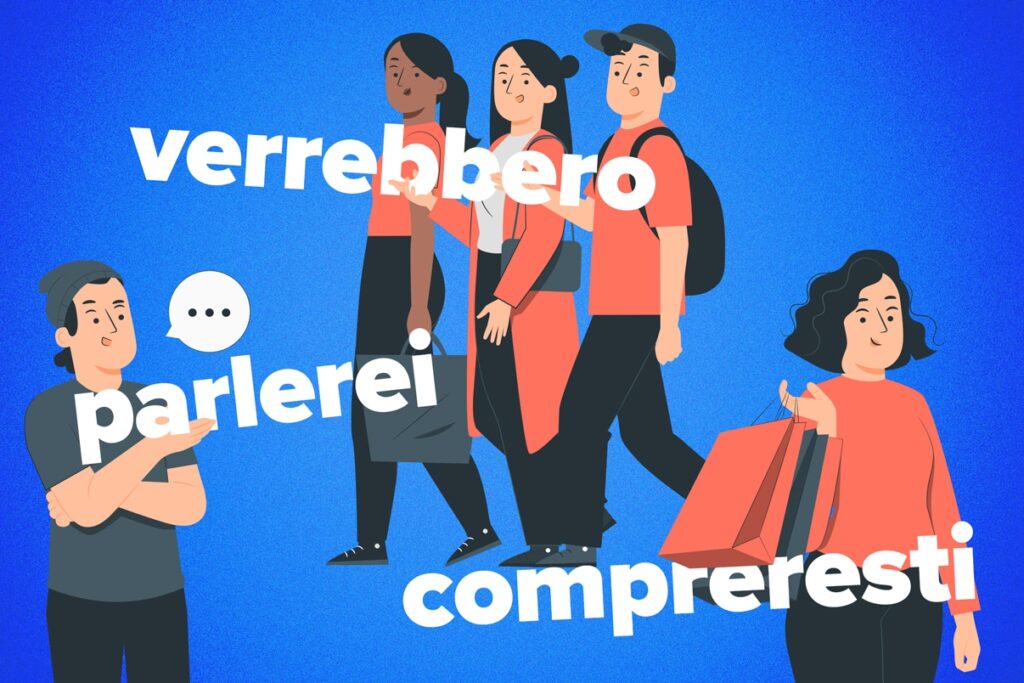
How to Use the Italian Conditional
What do you do when you want to daydream in Italian? Make plans and plan Bs? Or just ask, “what if…?”
This is when you’ll need the Italian conditional.
The conditional is used for situations that are as simple as making polite requests and as complex as imagining an alternate reality and its consequences.
In this post, you’ll get a primer on the Italian conditional, learn its conjugations and see how it’s used in different contexts.
Contents
- What Is the Italian Conditional?
- How to Form the Italian Conditional
- When to Use the Italian Present Conditional
- The Past Conditional in Italian
- Practice Resources for the Italian Conditional
- And One More Thing...
Download: This blog post is available as a convenient and portable PDF that you can take anywhere. Click here to get a copy. (Download)
What Is the Italian Conditional?
The conditional, or il condizionale, is one of the four moods in Italian. It’s used to express hypothetical or uncertain situations, polite requests and wishes. It’s often translated into English as “would” or “could” plus a verb.
The conditional is commonly used in situations where the outcome depends on a condition, expressing what would happen under certain circumstances. For example:
Io parlerei italiano se fosse facile. — I would speak Italian if it were easy.
This is the present conditional, but there’s also a past conditional that can be used to talk about hypothetical situations in the past:
Se avessi saputo della festa, sarei venuto. (If I had known about the party, I would have come.)
How to Form the Italian Conditional
To use this mood correctly, it’s important to know how to conjugate verbs, both regular and irregular.
Regular Conjugation in the Present Conditional
Regular –are and –ere verbs get the same endings in the present conditional, while -ire verb endings are different by one letter:
| -are and -ere verb endings | -ire verb endings |
|---|---|
| -erei | -irei |
| -eresti | -irei |
| -erebbe | -irebbe |
| -eremmo | -iremmo |
| -ereste | -ireste |
| -erebbero | -irebbero |
Let’s look at the regular verb parlare (to speak) as an example. The –are ending is removed and the following bolded endings are added:
| Italian | English |
|---|---|
| io parlerei | I would speak |
| tu parleresti | you (singular, informal) would speak |
| lui/lei/Lei parlerebbe | he/she/you (singular, formal) would speak |
| noi parleremmo | we would speak |
| voi parlereste | you (plural) would speak |
| loro parlerebbero | they would speak |
Now, let’s look at the example of fuggire (to escape, to run away). We remove the –ire ending and add conditional endings as follows:
| Italian | English |
|---|---|
| io fuggirei | I would escape |
| tu fuggiresti | you (singular, informal) would escape |
| lui/lei/Lei fuggirebbe | he/she/you (singular, formal) would escape |
| noi fuggiremmo | we would escape |
| voi fuggireste | you (plural) would escape |
| loro fuggirebbero | they would escape |
There are some spelling changes for certain verbs in the conditional. These are to ensure that the pronunciation of the last consonant in the stem remains consistent once the conditional endings are added:
- Verbs ending in –ciare and –giare drop the i before adding all of the above endings. So, for example, cominciare (to begin) becomes io comincerei, tu cominceresti, lui comincerebbe, etc. (I would begin, you would begin, he would begin, etc.)
- Verbs ending in –care and –gare must have an h added to the end of the verb stem. So legare (to tie) becomes io legherei, tu legheresti, lui legherebbe, etc. (I would tie, you would tie, he would tie, etc.)
Irregular Italian Conditionals
There are some irregularities in the stems of some verbs in the present conditional. These are the same irregularities you’ve already seen if you’ve studied the simple future tense.
For example, the common verb essere (to be) undergoes some odd changes:
| Italian | English |
|---|---|
| io sarei | I would be |
| tu saresti | you (singular, informal) would be |
| lui/lei/Lei sarebbe | he/she/you (singular, formal) would be |
| noi saremmo | we would be |
| voi sareste | you (plural) would be |
| loro sarebbero | they would be |
Here are some additional common irregular verbs in the conditional that you should be aware of. It’s easiest to think of them as falling into two groups when you’re preparing to study them.
In the first group, the first vowel of the ending gets eliminated. Otherwise, the endings are the same.
• Andare (to go) — io andrei, tu andresti, lui andrebbe, etc…
• Avere (to have) — io avrei …
• Cadere (to fall) — io cadrei …
• Dare (to give) — io darei …
• Dovere (to have to, must) — io dovrei …
• Fare (to make, to do) — io farei …
• Potere (to be able to) — io potrei …
• Sapere (to know) — io saprei …
• Stare (to be) — io starei …
• Vedere (to see) — io vedrei …
• Vivere (to live) — io vivrei …
In the second group of irregulars, Italian contracted infinitives get shortened as is their tendency, and the first vowel of the ending is dropped, which leaves a double r.
Once again, the endings remain otherwise the same for each pronoun:
• Bere (to drink) — io berrei, tu berresti, lui berrebbe, etc…
• Condurre (to drive) — io condurrei …
• Tenere (to hold, to keep) — io terrei …
• Venire (to come) — io verrei …
• Volere (to want) — io vorrei …
When to Use the Italian Present Conditional
Being Extra Polite
The easiest way to use the Italian conditional is for simple, very polite requests like ordering food and drinks with vorrei… (I would like…), from the verb volere (to want).
Now that you know the conjugations, you can also use it in the plural:
Vorremmo tre birre per favore. (We’d like three beers, please.)
But this use isn’t just for the verb volere. The conditional can also be used to “lighten up” phrases, especially when you’re asking for something.
Mi compreresti uno zaino per favore? (Would you buy a backpack for me, please?)
Quali date andrebbero bene per te? (Which dates would be good for you? — Literally “would go well…”)
Hypothetical Events
The Italian conditional is also used to express hypothetical situations or possibilities:
Ti faresti più amici in città. (You’d make more friends in the city.)
Saremmo più felici con un cane. (We’d be happier with a dog.)
Andrei in treno, ma non posso permettermi il biglietto. (I’d go by train, but I can’t afford the ticket.)
Dovrebbe venire Raffaella, ma non ho molto fiducia in lei. (Raffaella is supposed to come, but I don’t have much faith in her.)
The conditional along with the verb dovere (to have to, must) can be translated as “should” or “is supposed to,” among other things. This is a common way of talking about what’s meant to happen.
You’ll also use the conditional if you pose hypothetical questions:
Come vivreste nei miei panni? (How would you live [if you were] in my shoes?)
Here are a few more relatively simple examples that employ the conditional:
Nel caso che ci siano dubbi, potresti domandare a me. (If you should have any doubts, you could ask me.)
Questo le farebbe impazzire. (This would blow her mind.)
La canzone dice che la vita sarebbe orribile senza il vino. — The song says that life would be horrible without wine.
Conditional + se (if) + Imperfect Subjunctive
A related use of the conditional is in combination with the imperfect (past) subjunctive. Here’s a simple example.
Se avessimo i soldi, andremmo in vacanza. (If we had the money, we’d go on vacation.)
The word avessimo is the imperfect subjunctive of avere (to have) and andremmo is the conditional of andare (to go).
The order can be changed around, but note that the word se (if) always sticks with the imperfect subjunctive. You don’t use se just before the conditional.
With this construction, you can up all kinds of situations and then say what would result:
Vivrei ancora a casa se non avessi trovato questo lavoro. (I’d still be living at home if I hadn’t got this job.)
The Past Conditional in Italian
The past conditional, or condizionale passato, is used to talk about past hypotheticals and to recount what someone else said, which we call indirect speech.
To form the past conditional, put the verb avere or essere in the conditional form and then add the past participle of the main verb. This is similar to the way we form the future perfect tense. For example: avrei finito (I would’ve finished).
Like in the present conditional, this verb form is often used in hypothetical “if” clauses:
Se avessi avuto più tempo, avrei finito di leggere quel libro. (If I had had more time, I would’ve finished reading that book.)
Saremmo arrivati in orario se non ci fossimo fermati a prendere un caffè. (We would’ve arrived on time if we hadn’t stopped for coffee.)
Se Valeria avesse vinto alla lotteria, avrebbe viaggiato per il mondo. (If Valeria had won the lottery, she would’ve traveled around the world.)
As well as for reported or indirect speech:
Ha detto che avrebbe lavato i piatti. (He said that he would wash the dishes.)
Ho promesso a mia madre che avrei fatto i compiti. (I promised my mom that I would do my homework.)
This is slightly different than in English, where we would use the present conditional for the indirect speech. Check out this post to learn more about the Italian past conditional.
Practice Resources for the Italian Conditional
To master all of the conjugation and usage details, try writing sentences about yourself using the structures above. Or create your own hypothetical Italian situations based on what you dream up: what would happen if you fell in love with an Italian? Or, what would you do if someone stole your wallet?
Once you think you’ve perfected your practice sentences, ask a language partner or tutor to check them. Correct your sentences together and then try to see if you can make new ones in conversation by re-using the words and structures.
You can find plenty of additional practice resources online. For example:
- Use online worksheets like this one to practice your conjugations
- Purchase a great textbook like “Soluzioni: A Practical Grammar of Contemporary Italian” by Denise de Rome
- Immerse yourself in Italian content so you can see how native speakers use it. You could use the FluentU program to see the conditional used in context in videos and example sentences.
FluentU takes authentic videos—like music videos, movie trailers, news and inspiring talks—and turns them into personalized language learning lessons.
You can try FluentU for free for 2 weeks. Check out the website or download the iOS app or Android app.
P.S. Click here to take advantage of our current sale! (Expires at the end of this month.)
There’s a lot of information in this post, but don’t worry—you don’t have to learn it all at once!
Bookmark this page and come back to it. It can serve as a useful guide to pair with some practice resources until you feel confident using the Italian conditional.
Download: This blog post is available as a convenient and portable PDF that you can take anywhere. Click here to get a copy. (Download)
And One More Thing...
If you're as busy as most of us, you don't always have time for lengthy language lessons. The solution? FluentU!
Learn Italian with funny commericals, documentary excerpts and web series, as you can see here:
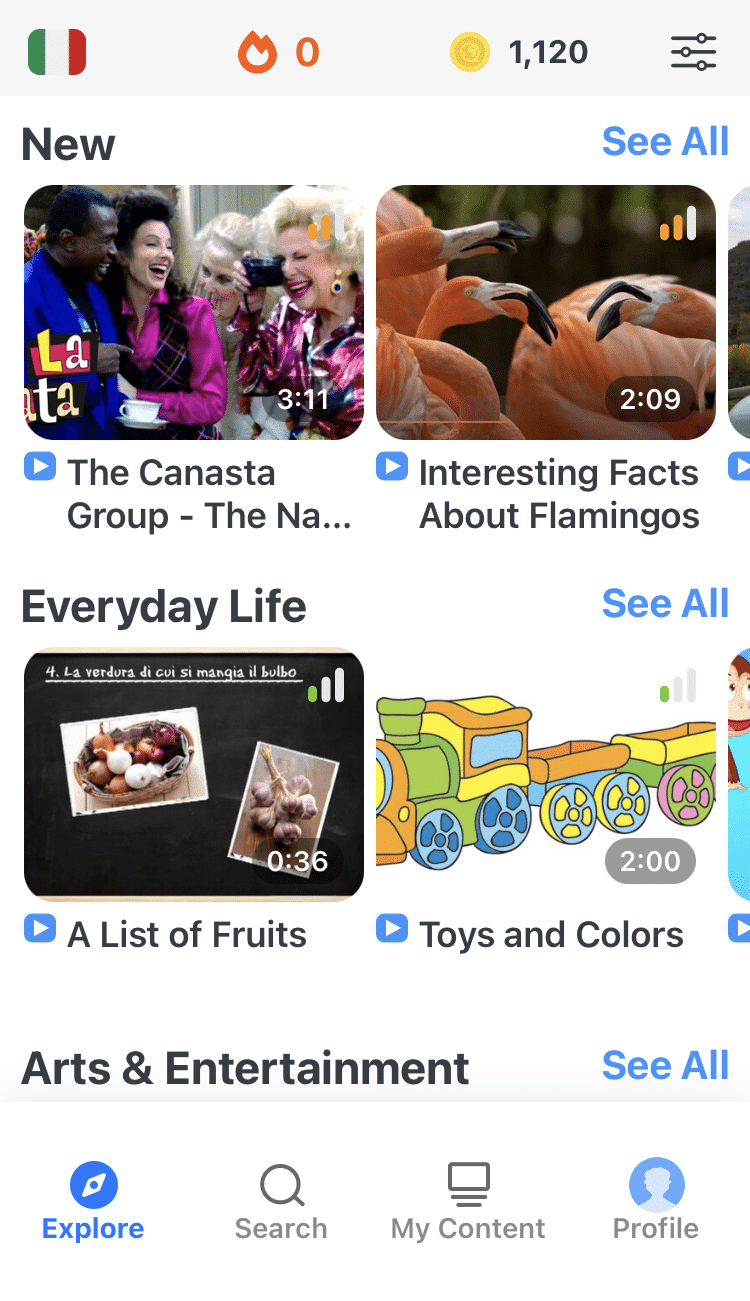
FluentU helps you get comfortable with everyday Italian by combining all the benefits of complete immersion and native-level conversations with interactive subtitles. Tap on any word to instantly see an image, in-context definition, example sentences and other videos in which the word is used.
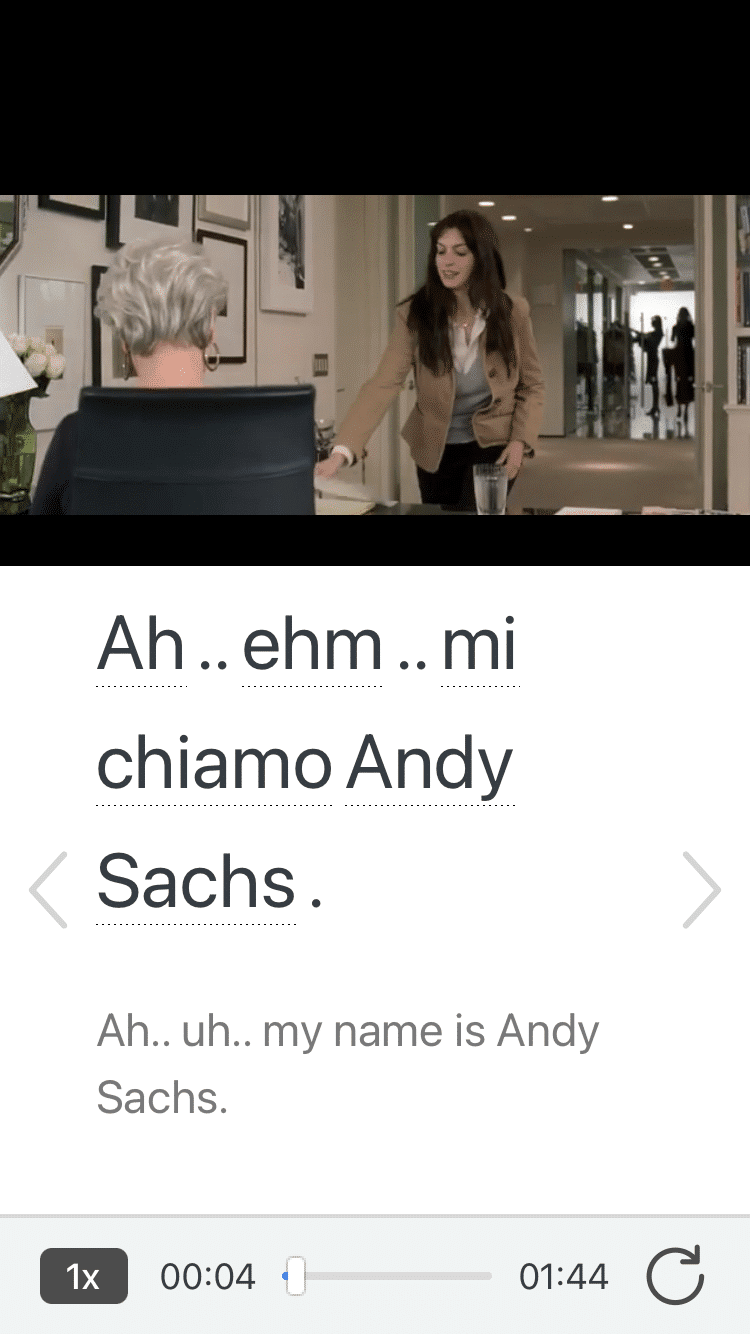
Access a complete interactive transcript of every video under the Dialogue tab, and review words and phrases with convenient audio clips under Vocab.
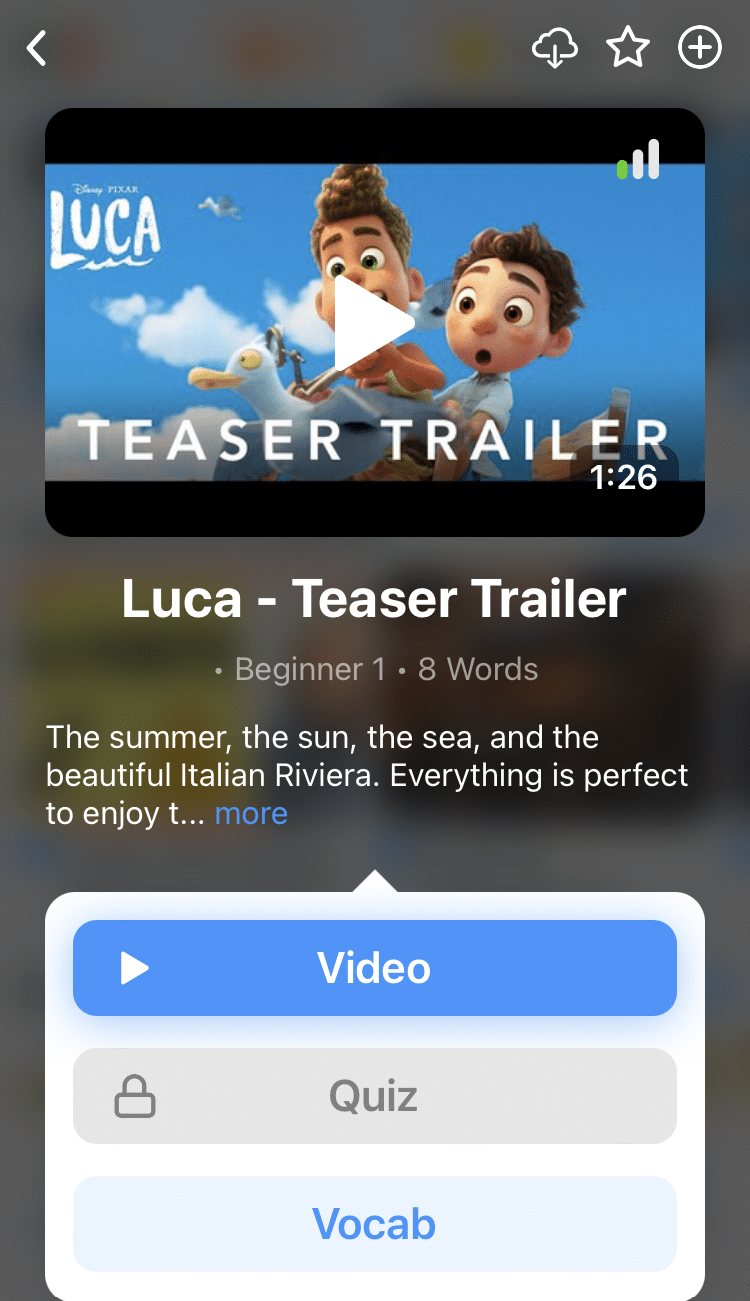
Once you've watched a video, you can use FluentU's quizzes to actively practice all the vocabulary in that video. Swipe left or right to see more examples of the word you’re on.
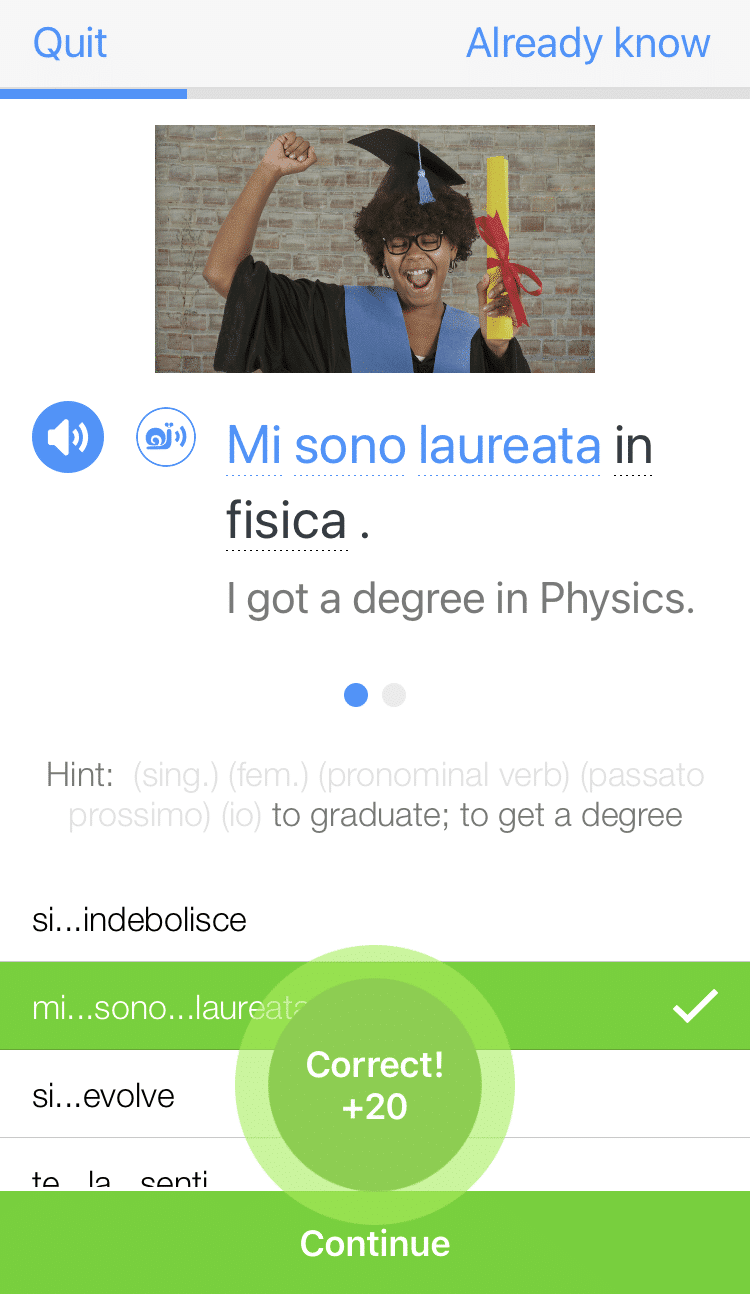
FluentU will even keep track of all the Italian words you’re learning, and give you extra practice with difficult words. Plus, it'll tell you exactly when it's time for review. Now that's a 100% personalized experience!
The best part? You can try FluentU for free with a trial.
Start using the FluentU website on your computer or tablet or, better yet, download the FluentU app from the iTunes or Google Play store. Click here to take advantage of our current sale! (Expires at the end of this month.)



